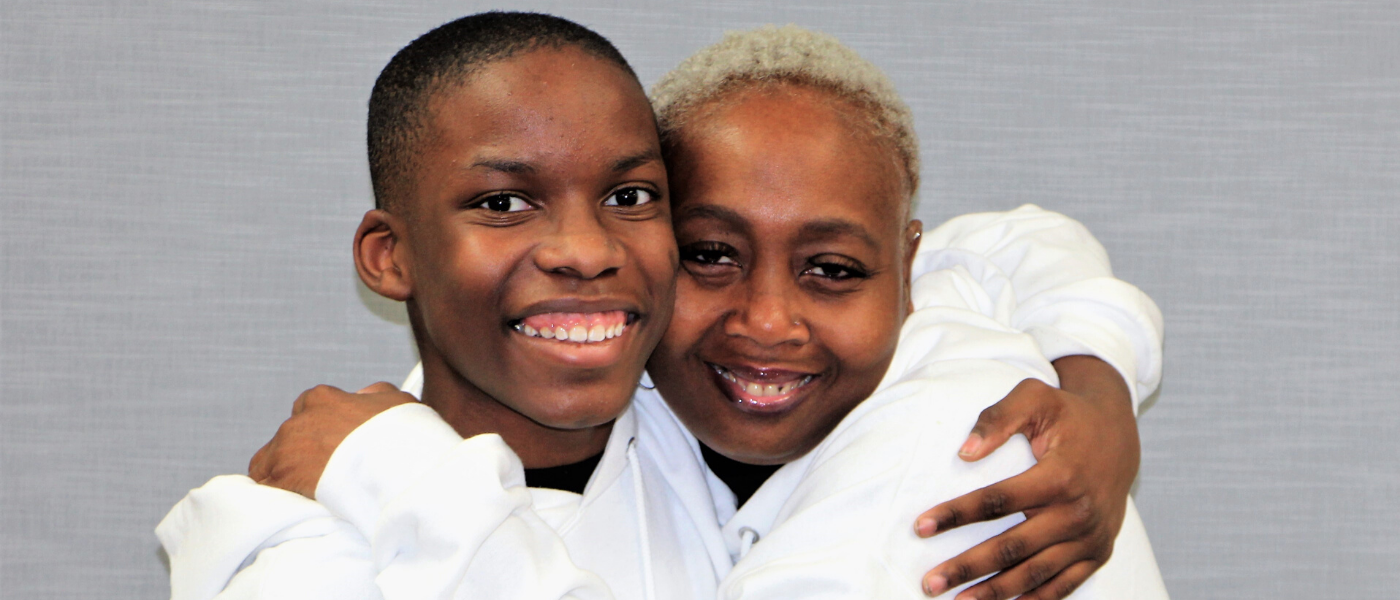A Not-So-Typical Pre-Teen
Ja’Meir is a bright-eyed sixth grader with a sunny smile and an even sunnier disposition. At 12, his face still looks boyish but there’s something about his grin that hints at a wisdom beyond his years. He is a unique mix of shy and energetic, and it’s hard not to be swept up into his youthful exuberance.
When you look at Ja’Meir today, you see a typical pre-teen. He spends his time doing homework, solving Rubik’s Cube puzzles and playing soccer. Yet not too long ago, life was anything but typical for Ja’Meir and his grandmother Gwendolyn, who is raising him. He and his grandmother, who he calls Nana, began to fight a lot. She described him as “snappish,” noncompliant and exhibiting an attitude that was “off the charts.” And he was getting in trouble at school, too.
“My phone would ring and the school’s number would come up and I’d say, ‘this is just more often than you want to see your child getting called to the office,’” Gwendolyn said, shaking her head in exasperation at the memory. “He had started making some bad choices and I was really afraid he was going to get in legal trouble down the road.”
When asked what that time was like for him, Ja’Meir sums it up simply, “It was horrible.”
Intensive Home-Based Treatment: A Turning Point
This past summer, however, things began to turn around. That’s when Ja’Meir and his grandmother began Intensive Home-Based Treatment through Positive Education Program. IHBT, which is a service under the PEP Connections umbrella, provides intensive home-based family therapy designed for youth with serious emotional issues. The IHBT therapist engages the whole family in therapy sessions, which occur twice a week for total of three to six hours. There is also 24/7 crisis support and case management.
Simone Cook-Fuentes, the family’s therapist, says the first thing she did with the family was address the trauma Ja’Meir had experienced. “It’s crucial to validate what someone has been through before you start trying to change behaviors,” said Cook-Fuentes. “Ja’Meir was really open to talking about his experiences and willing to learn new behavior.”
She explained shifting the focus from behavior to a trauma-informed perspective was the key that unlocked an entire transformation for the family. Also central to the success was an emphasis on Ja’Meir’s strengths rather than what he’d done wrong.
“As Gwendolyn began to understand Ja’Meir’s behaviors as a reflection of his trauma, she became much less frustrated and more determined to help him understand what was appropriate and what wasn’t,” said Cook-Fuentes. “And Ja’Meir never even knew he was in therapy,” she laughed. “We would play basketball or Bey Blades and just chat. He was so open to talking when we played that he made tremendous strides in a very short time.”
A Family Transformed
For Ja’Meir and his grandmother, IHBT made a world of difference. Ja’Meir’s grades have improved and he is monitoring them regularly. He has been moved out of the alternative option testing group at school to the typical classroom for standardized testing. “Before IHBT, I thought I wasn’t good enough for honors. Now I’m on the honor roll,” beams Ja’Meir, when asked about how school is going now. He is clearly proud of himself. His grandmother is, too.
Most importantly, Ja’Meir and Gwendolyn are getting along much better. “My relationship with Nana has deepened and has more meaning.” smiles Ja’Meir. “I love my nana so much and the reason I’m doing well is I want her to be happy.”
Gwendolyn agrees that their relationship has improved but admits there is still work to be done. She says things aren’t perfect – the morning routine is still a challenge – but now they have the tools in place to continue improving. For Gwendolyn, IHBT has provided peace of mind and eased her worries. Her days are smoother, and her phone is ringing a lot less. “I’m not as stressed. I can exhale a little bit – not to the point where I can completely let go, but I know I can take care of him.”
There is Hope
The story of Ja’Meir and his grandmother is very special, but it isn’t rare for a family to experience a life-changing transformation through PEP’s Intensive Home-Based Treatment, a service of PEP Connections. For families struggling with these types of challenges, there is hope.
For Ja’Meir and Gwendolyn, who had almost lost hope last year, the future is bright. Ja’Meir plans to become a professional soccer player when he grows up and is busy keeping up his grades and playing viola with the school orchestra. Gwendolyn is happy to be able to go about her days without worrying about the phone ringing all the time.
“PEP IHBT was amazing. The whole experience has been positive, positive, positive!” Gwendolyn enthuses. “I would recommend it to anyone 199 percent!”
IHBT Basics
Intensive Home-Based Treatment serves young people struggling with severe mental health issues who are often unable to remain safely in their homes. It is an all-inclusive service that engages the entire family to ensure these youth thrive at school, home and the community. It is available to youth with serious mental health issues from ages 3-17. Service eligibility is determined through the Child and Adolescent Needs and Strengths (CANS) tool. Prior authorization is required through Medicaid.
In addition to IHBT, PEP offers an array of services for struggling children and their families including intensive care coordination/high-fidelity wrap around, which also falls under the PEP Connections umbrella.
For more information on IHBT visit our website. To make a referral, call (216) 361-2441 or visit our online referral page.
